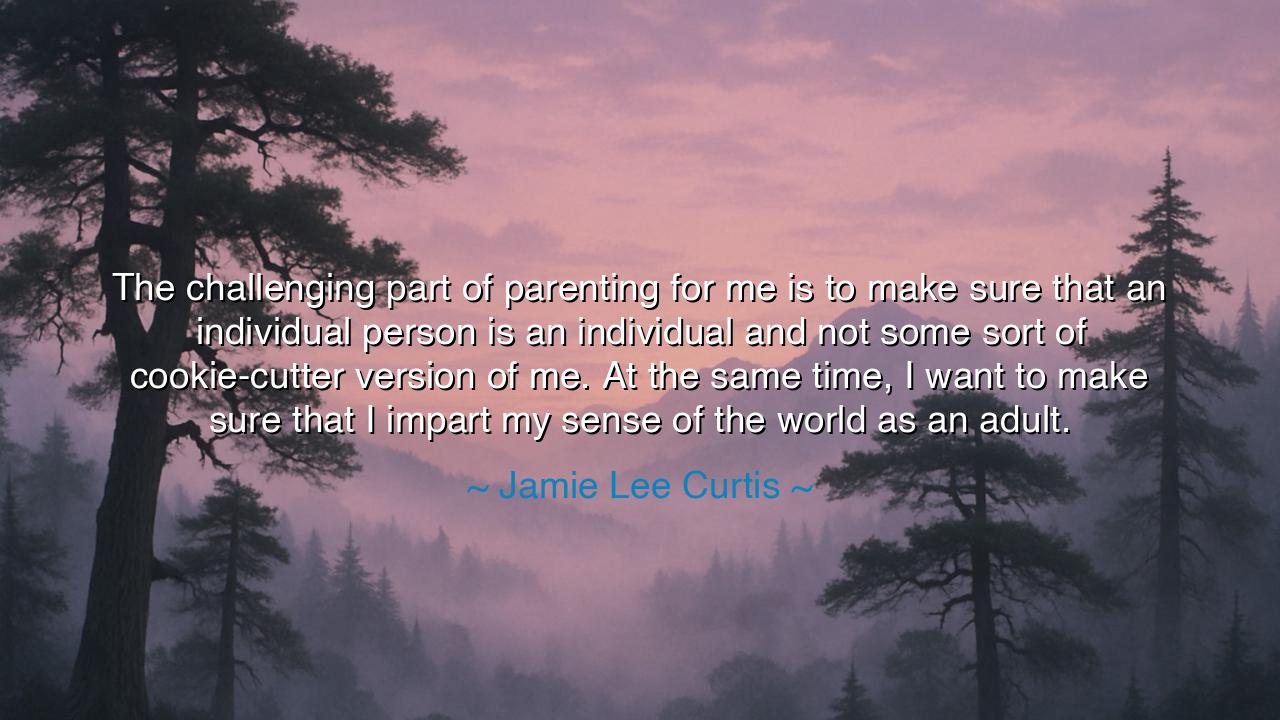
The challenging part of parenting for me is to make sure that an
The challenging part of parenting for me is to make sure that an individual person is an individual and not some sort of cookie-cutter version of me. At the same time, I want to make sure that I impart my sense of the world as an adult.






Hearken, O seekers of wisdom, to the thoughtful words of Jamie Lee Curtis, who declares: “The challenging part of parenting for me is to make sure that an individual person is an individual and not some sort of cookie-cutter version of me. At the same time, I want to make sure that I impart my sense of the world as an adult.” In this reflection shines the eternal struggle of parenting: how to guide without controlling, how to teach without erasing, how to shape without smothering the natural essence of the child.
The origin of her words lies in the timeless tension between tradition and individuality. Parents are both mirrors and makers: they see themselves reflected in their children, yet they must resist the temptation to mold them entirely in their own image. Curtis confesses the difficulty of this balance—to allow the child’s soul to grow in its own direction, while still giving them the treasures of wisdom, perspective, and moral vision that come from adulthood. This is the paradox of nurture and freedom: to create conditions for growth without dictating every step.
Consider the story of Siddhartha Gautama, later known as the Buddha. His father, a king, tried to mold him into the perfect ruler, shielding him from suffering and forcing him into a life of luxury. Yet Siddhartha rejected this “cookie-cutter” version of himself, leaving the palace to seek truth. Only by breaking away from the imposed image of his father did he find enlightenment, and in doing so, he imparted wisdom to the entire world. This story reveals Curtis’s point: children must be allowed to become individuals, lest the parent’s shadow rob them of their own light.
The emotional weight of Curtis’s confession lies in its honesty. Parents yearn to give their children the best parts of themselves—their values, their hard-won wisdom—but fear that in doing so, they might inadvertently suppress the child’s uniqueness. To “impart one’s sense of the world” is noble, yet the risk is always present: that what is meant as guidance becomes control, and what is meant as love becomes limitation. Thus, the true art of parenting lies not in replication, but in cultivation—watering the roots without dictating the shape of every branch.
In practical terms, Curtis’s insight teaches us that parents must learn to listen as much as they instruct. They must pay attention to the inclinations, passions, and strengths of their children, even when they differ from their own. The child who loves music must be allowed to sing, even if the parent dreamed of them becoming a scholar. The child who questions must be allowed to doubt, even if the parent clings to certainty. In honoring individuality, parents prepare children not only to live, but to thrive authentically.
Yet there is also a heroic dimension: parents must impart values and wisdom, for children cannot grow in a vacuum. To release them entirely without guidance is as dangerous as smothering them. The parent’s duty is to act as both guardrail and lantern—not dictating the path, but illuminating it with insight born of experience. This is the balance Curtis speaks of: the courage to guide while letting go, the wisdom to teach without binding, the love to honor difference while offering truth.
From this reflection arises a clear lesson: let every parent strive to give their children two priceless gifts—the roots of wisdom and the wings of individuality. Impart your values, but do not demand imitation. Teach your truths, but allow your children to discover their own. Love them not for the ways they resemble you, but for the ways they are uniquely themselves. For in this delicate balance, parents not only raise children but nurture free souls who carry both the legacy of their elders and the promise of their own destiny.
Thus, the teaching of Jamie Lee Curtis endures: the challenge of parenting is to shape without stifling, to guide without controlling. Let all who walk this path remember: children are not mirrors, but flames, each burning with its own light. The task of the parent is not to make them copies, but to make them strong enough to shine as themselves, bearing forward both their own truth and the wisdom passed down to them.






AAdministratorAdministrator
Welcome, honored guests. Please leave a comment, we will respond soon